Let’s examine Docker and Kubernetes to see the place these two stand in opposition to one another.
We’ll additionally discuss some alternate options to the orchestration instruments aside from Kubernetes. We’ll go additional and dig into the comparability between Docker Swarm and Kubernetes intimately.
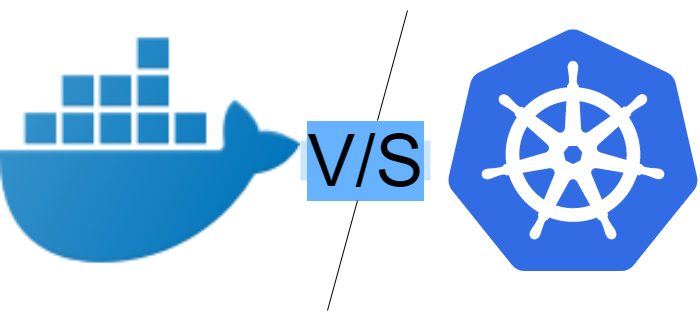
What’s Docker?
To the unripe eye, it might appear that creating an app is all about writing robust code. However the true problem lies in coping with a number of languages, working throughout totally different frameworks, and managing disruptive interfaces between the instruments. The Docker involves the rescue right here!
It’s a manner that helps the customers familiarize yourself with the applying throughout growth and runtime. It mitigates the issues you face throughout these phases. It additionally helps in getting understanding of how the applying needs to be uncovered to the community, manages storage and reminiscence utilization and in addition controls entry rights exterior the applying.
In abstract, it’s a manner to supply a constant surroundings on any OS appropriate host (Linux or Home windows).
Docker options
- Easy and quick configuration – Codes will be deployed in much less time with minimal effort
- Will increase Productiveness – It reduces assets and can be useful in fast software deployment.
- Utility Isolation – Dockers use the containers to run the purposes. These containers present isolation for these purposes.
- Security administration
Many purposes run on Docker.
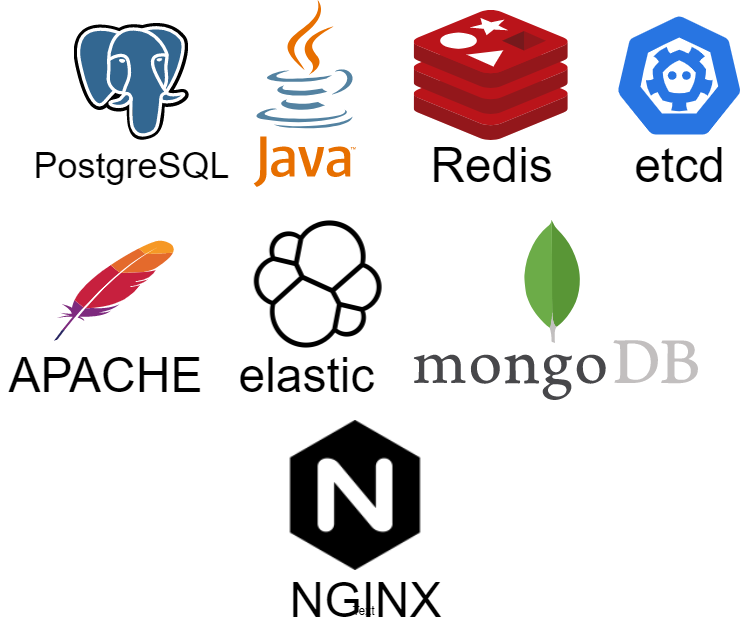
What’s a Kubernetes (or K8s)?
Kubernetes is a container administration instrument that automates deployment.
It’s an open-source transportable platform designed by Google and now operated by a cloud-native computing basis. It helps in updating the purposes simpler and quicker with none downtime. It takes care of the work of scheduling containers on the cluster and in addition manages the workload.
Kubernetes has two extra names: ‘k8s’ and ‘Kube’.
This orchestration platform automates many guide processes, comparable to deploying, managing, and scaling the purposes within the container.
Kubernetes options
- Automates guide processes – Simply describe the specified state utilizing Kubernetes, and it’ll flip the present grow to be the specified one.
- Load Balancing – Kubernetes is nice at load balancing in case there’s extra site visitors to the container. It distributes community site visitors and retains the deployment steady.
- Self-healing – That is one in all Kube’s finest options. It restarts the damaged containers, replaces them and in addition kills the one that doesn’t reply to the user-defined sample.
- Storage orchestration – Customers can robotically mount a storage system of their selection utilizing Kubernetes.
Docker vs Kubernetes
Docker and Kubernetes are totally different applied sciences.
So it’s considerably unfair to match these two or to surprise which one ought to take priority. These two are usually not direct rivals. Nonetheless, they’re associated! Docker is one container platformwhereas Kubernetes a container orchestrator for containerization platforms comparable to Docker.
Let’s perceive this intimately with the picture under.
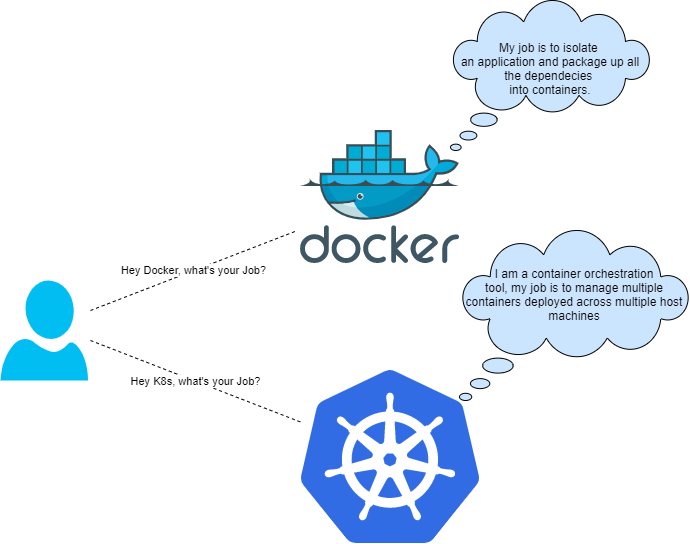
This illustrates that Docker and Kubernetes go hand in hand and work in parallel.
Docker is used to isolate your software into containers whereas Kubernetes is a container scheduler/orchestration instrument and is used to deploy and scale your software by managing a number of containers deployed on a number of host machines.
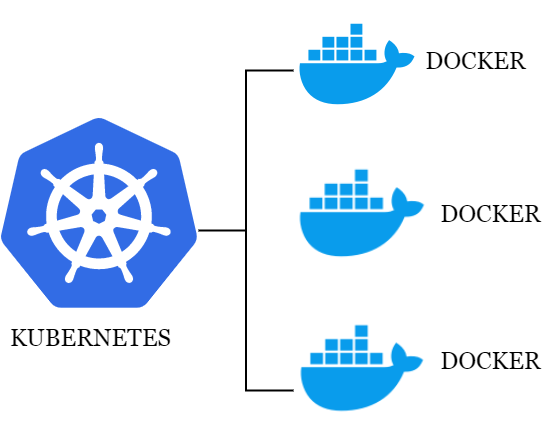
Let us take a look at some similarities between Docker and Kubernetes.
- Each are drawn to a microservices-based structure.
- They’re largely written in Go, which permits them to be shipped as light-weight binaries.
- Each use YAML information and these information are simply human readable.
Choice for Docker and Kubernetes
If we have a look at every software from a theoretical perspective, all of it appears to be like easy and hassle-free. The actual challenges solely change into seen after the sensible implementation. Factors to be thought of for a profitable final result of every software are listed right here:
- Is that this know-how economical?
- Does it drive enterprise development?
- Will it assist scale back downtime?
- Will it show helpful in conserving assets?
- Will it forestall unintended human error?
- Will it enhance computing energy?
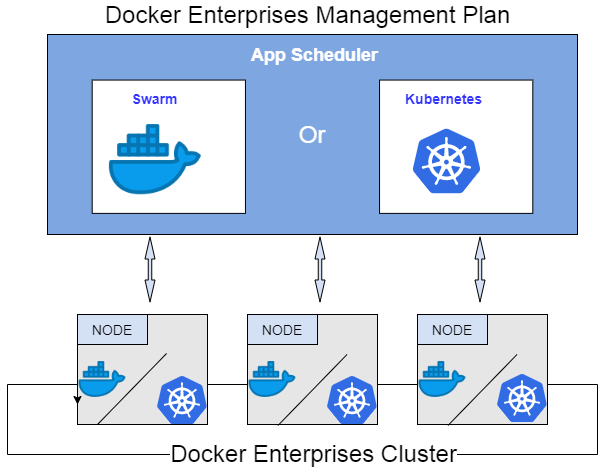
Then, from Docker or Kubernetes, we have to select one or the opposite relying on the use case.
When do you select Docker?
In case your use case makes use of microservices-based structure, you should use Docker containers for every microservice. One of the best use case of the containerization platform as Docker is for microservice structure.
When do you select Kubernetes?
Kubernetes is a really quick evolving know-how because of its open-source platform function. Every group offers its plugins by way of totally different providers, comparable to networking. The usage of these plug-ins, particularly within the manufacturing surroundings, can pose a excessive safety threat.
So to guard the safety facet, it’s recommended to make use of a stable cloud based mostly hosted answer.
If you do not have in-depth information of the system, it is simple for one thing to interrupt. So make your selection properly.
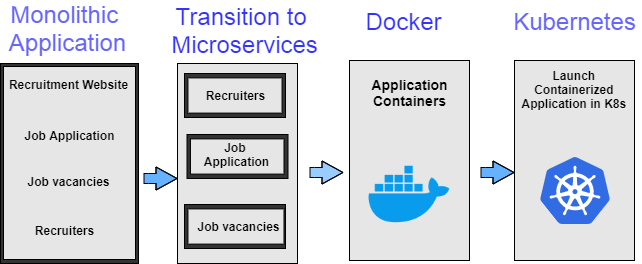
Docker vs Kubernetes based mostly on utilization state of affairs
| What is nice at what? | |
| Docker: Docker is finest when a person has a posh software the place all packages and configurations have to be packaged in a conveyable container. | Kubernetes: Kubernetes is nice if you’ll want to ensure that your software runs because it ought to. Within the occasion {that a} container turns into unresponsive or malfunctions, it ought to restore itself and thus begin a brand new container. |
| When to make use of what? | |
Docker: It may be used for any of those circumstances:
|
Kubernetes: It may be used for the case under:
|
As a result of it’s crystal clear that each applied sciences go hand in hand and observe one another. So what makes folks assume there’s a potential competitors between Docker and Kubernetes? The explanation behind that is Docker swarm. Docker swarm can be one in all Docker Inc’s container orchestration instruments, which is why the business compares Docker to Kubernetes.
Kubernetes Options?
Beneath are among the orchestration instruments that may be confirmed as good alternate options to Kubernetes.
- Docker swarm
- Open Shift
- Mesos
- rancher
- Amazon ECS
- Apache Marathon
- Nomad
- Holder
- Minicube
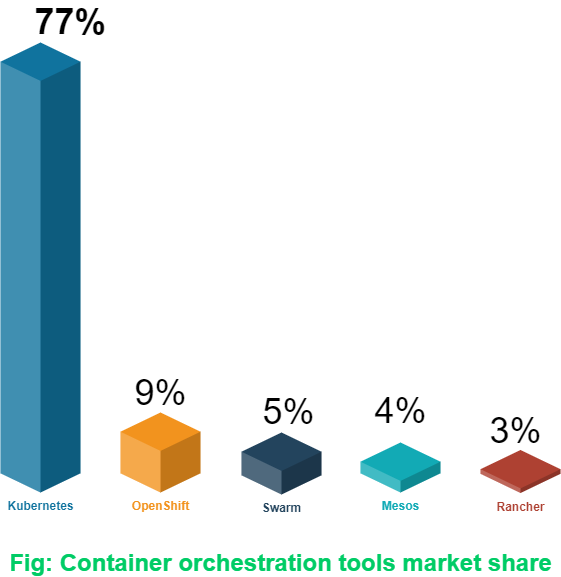
After Kubernetes and OpenShift, Docker Swarm is extra widespread within the business. Let’s talk about and analyze Docker Swarm how it’s totally different and the place it stands in opposition to Kubernetes.
What’s Docker Swarm?
That is an inside container orchestration instrument developed by Docker to mess around with containers operating within the Docker surroundings. It’s used for clustering and scheduling. It permits for a number of administration containers deployed on a number of host machines. It makes use of the usual Docker API and networking capabilities, making it simple to get into any docker surroundings.
Working precept of Docker Swarm
- Backwards compatibility
- Secured by default with certificates
- Resilient and single-point-of-failure structure
- Easy but dynamic with a “simply works” person expertise
Kubernetes vs Docker swarm
Each orchestration instruments provide lots of the identical functionalities. The one distinction lies of their basic manner the 2 are operated. The desk under provides a greater thought of the comparability.
| Kubernetes | Docker swarm |
| Deployment: Purposes will be deployed utilizing a mix of deployments, pods, and providers/microservices. | Deployment: Purposes will be deployed as providers/microservices in a Swarm cluster. A YAML file can be utilized to signify a multicontainer. As well as, Docker Compose can deploy the app. |
| Set up: It’s guide in Kube. It requires good planning to make the Kube operational. The set up directions could differ from working system to working system and from supplier to supplier. | Set up: Set up is even simpler in Docker Swarm in comparison with Kubernetes. With Docker, just one set of instruments is required to learn to construct on the surroundings and configuration. |
| Working: Information of CLI (Command Line Interface) is required to run Kubernetes over Docker. To navigate inside a tree, one should perceive Docker CLI. Then the information of the frequent language infrastructure to be carried out for these applications. | Working: As talked about earlier, Docker Swarm is a instrument from Docker. So the identical frequent language is used for navigating inside a construction. This improves the pace of this instrument and permits for variability. Subsequently, Docker positive aspects a major ease of use benefit. |
| Logging: When the providers are deployed throughout the cluster, e.g. Elasticsearch/Kibana(ELK), Kubernetes helps a number of variations of monitoring and logging. | Logging: Within the case of Docker Swarm, solely monitoring is supported, and that’s with the third-party purposes. It’s due to this fact suggested to make use of Docker for monitoring functions with Reimann. |
| Scaling: For distributed programs, Kube is an all-in-one framework. It is a advanced system. It affords robust cluster well being ensures and a unified set of APIs. This, in flip, slows down container deployment and scaling. | Scaling: Not like Kubernetes, Docker Swarm’s pace to deploy the containers is far increased. In consequence, on-demand scaling can ship quick response instances. |
| Networking: For Kube, the community is flat. This enables all pods to speak with one another. In Kubernetes, two CIDRs are required in a mannequin, one is to acquire an IP tackle and the opposite is for providers. | Networking: In Docker Swarm, there’s an possibility for customers to encrypt container knowledge site visitors whereas creating their very own overlay community. |
Conclusion
We have now mentioned Docker and Kubernetes intimately and discovered that it’s not Docker, however the Docker Swarm which is a competitor to Kubernetes. We additionally summarized that Kubernetes dominates and has the higher hand over Docker Swarm. In case you’re excited by studying in depth, I like to recommend this Docker Mastery course.

